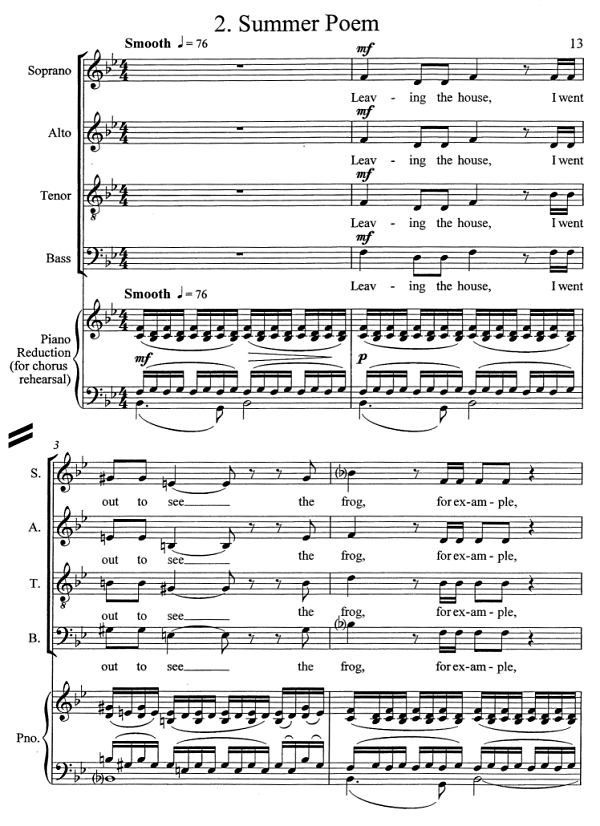SATB Chorus with String Quartet & Piano Accompaniment
Settings of eight Poems of Mary Oliver that are highly contrasting in texture and mood, trace a cycle in the natural world from dawn of one day to dawn of the next. This piece was co-commissioned by the Chatham Chorale and the New Amsterdam Singers.
| Composed: | 2006 |
| Text by: | Mary Oliver |
| Duration: | 23:005 |
| Publisher: | Pear Tree Press Music Publishing distributed by Subito Music |
| Catalog Number(s): | Piano/Vocal Score, 80500482 Full Score, 80500481 |
Reviews:
Poems by Mary Oliver are the basis of Ronald Perera’s colourful and poignant Why I Wake Early, named for the last of eight sections that move from one morning to the next. Both composers season their essentially tonal language with harmonic spices but what stands out in each score is expressive vocal and instrumental writing that flows from the texts with idiomatic grace and intensity. These are deeply affecting pieces and meaningful additions to the choral repertoire…. In his settings of the Oliver poems, Perera places the chorus in a series of glistening soundscapes in collaboration with string quartet and piano. The final titular poem basks in reflective beauty before taking euphoric wing on the words “I start the day in happiness, in kindness.”
Gramaphone (UK) December 2012
Nature demanded its due on Sunday afternoon, as clocks pushed forward for daylight savings time provided an extra hour of sunlight to observe debris strew by the ferocious windstorm on Saturday night. The New Amsterdam Singers seemed to have planned in advance with “As Nature Wakes,” an enjoyable mix of American and Czech works featuring nature as subject or metaphor, presented that afternoon at the Church of the Holy Trinity.
This adventurous amateur chorus, founded by the conductor, Clara Longstreth in 1968, celebrated its 40th anniversary with the New York premiere of Ronald Perera’s “Why I Wake Early,” jointly commissioned by it and the Chatham Chorale of Cape Cod, Mass. Mr. Perera set eight poems by Mary Oliver, a Cape Cod poet, for mixed chorus, string quartet, and piano.
Ms. Oliver’s poetry, which has drawn comparisons to the work of Emerson and Thoreau, reveals an awestruck regard of nature that verges on the religious: “What wretchedness, to believe only in what can be proven,” she writes in “I Looked Up,” the fifth poem in Mr. Perera’s cycle. Her work also demonstrates a discerning eye and an ability to render vivid images with a few deft strokes.
Mr. Perera sensitively underscores both attributes in a cycle spanning a day from one dawn to the next, linked by a subtle, recurring four-note motif. His music neatly conjures Ms. Oliver’s rippling pond, wary crows, flitting bats and lazily unspooling snake. At the same time, the work’s dramatic progression, from the shivering anticipation of “Morning at Great Pond” to the radiant affirmation of the concluding title poem, “Why I Wake Early,” does justice to the poet’s more transcendental intents. Enhanced by Mr. Perera’s estimable knack for setting English, this is a substantial addition to the choral canon.
The New York Times, 3/11/2008
Saturday’s Chatham Chorale concert at the Yarmouth Congregational Church gave listeners much to celebrate.
It marked the 20th year of Margaret Bossi’s tenure as director, and the concert became a special evening of Americana through works by composers with Massachusetts origins or connections — Leonard Bernstein, Irving Fine, Aaron Copland and the composer Ronald Perera. Perera’s composition Why I Wake Early, based on eight poems by Cape poet Mary Oliver, was given its world premiere and formed the centerpiece of the program.
In the tradition of the New England Transcendentalists like Emerson and Thoreau, Oliver’s poems are inspired by nature and our relationship to it. Her vision is essentially upbeat without denying the harsh realities of the natural world. She has written: “Every poem is music — a determined, persuasive, reliable, enthusiastic and crafted music.”
Perera, a Northampton resident who taught at Smith College for 30 years, has remarkably and faithfully caught and enunciated the spirit of that statement.
His music is eminently approachable (no hard lessons here in “self-improvement”) and wraps around the music of the poems comfortably and with telling effect.
In “Entering the Kingdom,” a piece about the poet tentatively entering the alien realm inhabited by crows, the composer used the time-tested techniques of a repeated passage in the bass, extended chords and skipping upward scales aided by dialogue from a skilled string quartet. In “Bats,” with its swooping choral and instrumental word painting and string and piano tremolos, the chorale sang well within itself presenting some of the best ensemble work of the evening.
The eighth and final setting of the work Why I Wake Early concludes the work on an unapologetically optimistic note. This is Perera’s second commission for the chorale, having written in 1991, The Outermost House, based on Henry Beston’s book about his solitary winter on the Cape in the mid-1920s.
Perera writes exceedingly well for the chorale and this work should find a permanent place in the American choral canon.
Cape Cod Times, 11/12/2007

Piano Vocal Score:
Full Score:
Audio Excerpt:
Audio excerpt is movement eight of Why I Wake Early. Performed by Coro Allegro, David Hodgkins, conductor, from the album Awakenings by Navona Records NV5878.
12. Why I Wake Early
